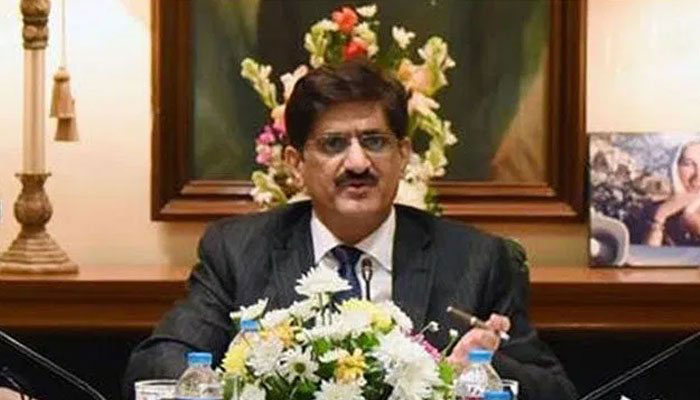Courts must not scrap laws passed by Parliament: Murad
KARACHI: Sindh Chief Minister Syed Murad Ali Shah has said the courts shouldn’t altogether discard the laws passed by the parliament, the apex institution of the country under the Constitution.
“This doesn’t happen anywhere else in the parliamentary system as laws should only be interpreted to check if they violate the fundamental rights or the Constitution,” said the CM while addressing the two-day national conference on “Strengthening parliamentary oversight for building peace & sustainable development in Pakistan,”, organised by Sustainable Social Development Organisation in collaboration with the Sindh Assembly. The conference was attended among others by Deputy Speaker of National Assembly, Qasim Khan Suri, PMLN’s former federal minister Ahsan Iqbal and lawmakers from the four provinces.
Speaking on the occasion, CM Shah lamented that courts in April suspended the law of the Public Service Commission in Sindh dating back to 1989, besides suspending all the recruitments made since then. Shah said that since April, his government had filed applications in Supreme Court four times for urgent hearing of the appeal against the Sindh High Court’s ruling to suspend the Public Service Commission but to no avail.
“I’m not a student of law but I have spent near about 20 years as a member of the assembly and have now started to understand law to a certain extent. The honourable judge shouldn’t go beyond the scope of the prayer of the petitioner while giving the ruling,” he said.
He said the parliament should assert itself to perform its role as the apex lawmaking institution of the country. “We are members of the legislative bodies and it is our duty to adopt laws but this power has been taken away,” he said. The parliament created the Constitution which in turn created all the other institutions,” the CM said. “Rest of the institutions are subservient to the parliament."
Shah termed the trend unfortunate that the lawmakers are not doing their fundamental work of legislation. He lamented that Pakistan hadn’t achieved the stage as yet where justice could be served to the poor man. “Justice couldn’t be dispensed in the society as unfortunately we don’t have rule of law,” he said.
Shah recalled that the Sindh government adopted certain good laws for social development including Sindh Child Marriage Restraint Act and the law to protect the rights of religious minorities.
The chief minister said that peace and justice were inter-linked with each other and they couldn’t be achieved separately nor without the strong and the strongest institution, which is the parliament. He said that peace was the necessary pre-requisite for achieving sustainable development.
Shah recalled that everyone played their due role to restore peace in Karachi and the personnel of the law-enforcement agencies had laid down their lives for the cause. It was the close coordinated efforts of the entire political-law enforcement and intelligence spectrum that Karachi, which was ranked as the sixth most dangerous city of the world in 2013-14, had now improved to 122th place.
-
 Nancy Guthrie Abduction: Piers Morgan Reacts To 'massive Breakthrough' In Baffling Case
Nancy Guthrie Abduction: Piers Morgan Reacts To 'massive Breakthrough' In Baffling Case -
 Adam Mosseri Set To Testify In Court Over Social Media Addiction Claims
Adam Mosseri Set To Testify In Court Over Social Media Addiction Claims -
 Will Warner Bros Finalize Deal With Paramount Or Stays Loyal With Netflix's Offer?
Will Warner Bros Finalize Deal With Paramount Or Stays Loyal With Netflix's Offer? -
 Palace Spotlights Queen Camilla For Her Work With Vision-impaired Children A Day After Andrew Statement
Palace Spotlights Queen Camilla For Her Work With Vision-impaired Children A Day After Andrew Statement -
 Kim Kardashian Still 'very Angry' At Meghan Markle, Prince Harry
Kim Kardashian Still 'very Angry' At Meghan Markle, Prince Harry -
 Texas Father Guns Down Daughter After Heated Trump Argument
Texas Father Guns Down Daughter After Heated Trump Argument -
 Andrew, Sarah Ferguson Quietly Adopts New Strategy To Control Public Narrative
Andrew, Sarah Ferguson Quietly Adopts New Strategy To Control Public Narrative -
 Harry Styles Refuses To Apologise For High Tour Ticket Prices In Rude Response: Source
Harry Styles Refuses To Apologise For High Tour Ticket Prices In Rude Response: Source -
 Ariana Grande Opens Up About ‘dark’ PTSD Experience
Ariana Grande Opens Up About ‘dark’ PTSD Experience -
 Angelina Jolie Says It Loud: 'Scars Define My Life'
Angelina Jolie Says It Loud: 'Scars Define My Life' -
 Climate-driven Wildfires Scorch Some Of World’s Oldest Trees In Patagonia
Climate-driven Wildfires Scorch Some Of World’s Oldest Trees In Patagonia -
 King Charles’ Ignorance Over Andrew & Jeffrey Epstein Not True? Foreign Office, MI6’s Work Comes Out
King Charles’ Ignorance Over Andrew & Jeffrey Epstein Not True? Foreign Office, MI6’s Work Comes Out -
 Police Detained 'innocent' Man In Nancy Guthrie's Kidnapping
Police Detained 'innocent' Man In Nancy Guthrie's Kidnapping -
 Co-founders Of Elon Musk's XAI Resigned: Here's Why
Co-founders Of Elon Musk's XAI Resigned: Here's Why -
 Dakota Johnson Reveals Smoking Habits, The Leading Cause Of Lung Cancer
Dakota Johnson Reveals Smoking Habits, The Leading Cause Of Lung Cancer -
 FAA Shuts Down El Paso Airport, Flights Suspended For 10 Days: Here’s Why
FAA Shuts Down El Paso Airport, Flights Suspended For 10 Days: Here’s Why




